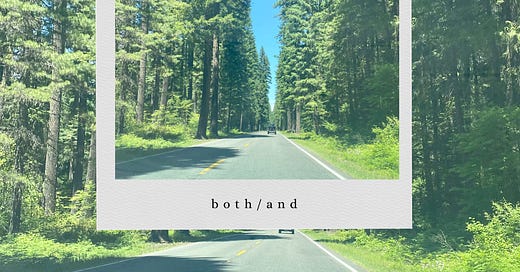Hello! It’s been some time since I wrote about why I think the patterns of our journeys are important and since there are many new subscribers, here’s a recap of what got me interested and why I think it’s relevant to all of us.
I grew up partly in India and partly in the Persian Gulf region, and until age 24 (when I moved to the US), I primarily read Indian and British authors. I didn’t come across Joseph Campbell’s The Hero With A Thousand Faces until I was in my early forties when my son came home from high school one day and talked about a universal monomyth called the hero’s journey, a story narrative common to cultures around the world. I immediately went and got Campbell’s book from the library.
It was a difficult time in my life. My way of being in the world wasn’t working for me anymore. It’s possible that it had never worked, but now I’d become aware there was a problem. I don’t know which is worse- to be stuck yet not be aware of it, or to know you’re terribly stuck and not know what’s causing the problem (patterns of behavior, life choices, midlife, etc.) nor a way to solve it. I am almost convinced the latter is worse. Anyway, I knew I was stuck, and Campbell’s book offered both hope and formula. Some people might find a formula stifling, but it can also offer a way forward.
I became obsessed with the book because I found parallels between many of my life experiences and the hero’s journey. It was like finding a source of light in a dark tunnel. But not just that. The tunnel is now lit up, and you see other travelers1, and immediately, you’re not alone anymore. Problems and stuck life situations can make you feel alone. You feel as though everyone else has gotten life figured out and is somehow moving on without you. If we don’t see our stories reflected in broader society, it can make us feel like they are invalid or don’t exist. I know my own situation left me feeling both invalidated and isolated. Campbell, with his heroic adventure and grand language, extended both context and companionship. From the hero’s journey, it was a short leap to Maureen Murdock’s heroine’s journey. I found her work fascinating though the heroine’s journey she described was very different from my own2.
Starting a conversation about different types of journeys is incredibly important and useful. It can help us acknowledge the diversity of our experiences, and that, in all probability, there might never be a universal hero or heroine’s monomyth. It can make us aware of known patterns yet be flexible and open to new, emerging ones. The older archetypal journeys (hero, heroine, etc.) are still relevant, and can be thought of as potential directionality. Or, as tethers, like something a mountain climber might use, to move with more surety rather than to confine.
It’s your turn! I’d love to hear your thoughts:
How have you experienced these archetypal patterns in your life?
Do you think a universal monomyth is likely?
Which one would you choose, a formula or opening to new, creative possibilities?
We have not even to risk the adventure alone
for the heroes of all time have gone before us.
The labyrinth is thoroughly known ...
we have only to follow the thread of the hero path.
And where we had thought to find an abomination
we shall find a God.
And where we had thought to slay another
we shall slay ourselves.
Where we had thought to travel outwards
we shall come to the center of our own existence.
And where we had thought to be alone
we shall be with all the world.” ―Joseph Campbell
I am not an expert, but there are probably a number of anthropological (especially cultural anthropology) and other more individual reasons why we resonate with one archetypal journey and not another.





I found Campbell in my early 20s, and it’s fair to say it informed a great deal of that decade of my life. I think what killed my appreciation of it was the commodification of it for Hollywood (eg Vogler’s The Writer’s Journey), and a growing understanding that it’s not the only path through a story, or through our inner lives. Which is a long way of saying, no, there’s no monomyth. But I appreciate any map that helps people sort out what they are going through - the Hero’s Journey, tarot, Myers-Briggs - they are all the same in that they hold the meaning that you bring to them.
Love this, Priya. It’s so resonates with my own experiences. I’ve mapped previous life events to the stages of the Hero’s Journey, which was illuminating. What I like about the Heroine’s Journey is its cyclical nature. I can find myself anywhere in the cycle and gain insights. If I had to name a step that gives me the most difficulty, it would be “refusal of the call”. I have a history of resisting saying yes to opportunities, or even of not recognizing them.